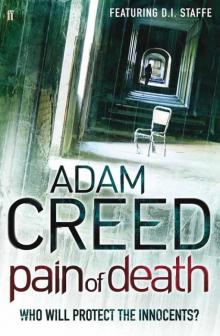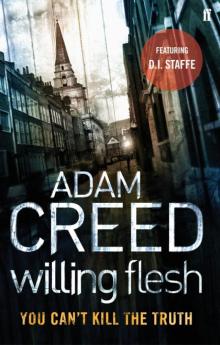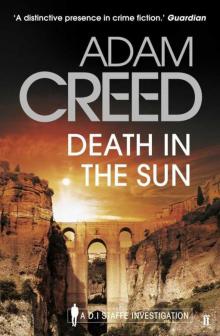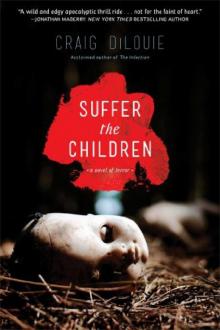- Home
- Adam Creed
Suffer the Children
Suffer the Children Read online
ADAM CREED
Suffer the Children
For Georgina
Contents
Title Page
Dedication
Monday Afternoon
Tuesday Morning
Tuesday Evening
Wednesday Morning
Wednesday Evening
Thursday Morning
Thursday Evening
Friday Morning
Friday Evening
Saturday Morning
Saturday Night
Sunday Morning
Sunday Evening
Monday Morning
Monday Night
Wednesday
Acknowledgements
Author the Author
Copyright
Monday Afternoon
Staffe raises his head as high as he can, sucks in the Underground air. He is pushed from behind and his chest rubs up against the head of a raven-haired woman as they shuffle towards the escalator. She curses in an eastern tongue and he wants to apologise, but knows it isn’t warranted, nor will it accomplish anything.
Judgement is scheduled for 14.00. He tries to push into the left-hand line but there is no gap. A group of teenage malevolents jostles through against the flow, leaving a sweet pall of solvents. He holds his breath as he takes a half step on to the moving escalator, waits, then breathes deep, and pictures Judge Burns; the events of the past two days in court. His nerves tighten and Staffe tries to calm his rushing blood. He makes sure the case papers are wedged tight into the pit of his arm and does up the collar of his shirt. The top button presses against his Adam’s apple as he swallows. He tightens his tie right up.
Staffe says a silent mantra, reaffirms that this is what he chose for himself. ‘This is my life. Be the best you can. This is my life. Be the best you can.’ He replays his responses to cross-examination from the morning and picks through Judge Burns’s summing-up for hints that the evidence they have garnered might prevail. He places a hand on his heart, feels the original of a secret witness statement in his breast pocket.
The world comes down to meet him, it seems, and the ticket barriers appear. They form a line between him and the white daylight beyond. News-sellers stand like bookends at the gateway to Chancery Lane.
The line of people clatters like dominoes and he has to shuffle forward with tiny steps and the raven-haired woman curses again. His phone vibrates in his trouser pocket and he fumbles for it, trying not to drop the pile of precious papers. By the time he manages to get the phone up to his ear, the ringing ceases. The screen shows Marie, the name of his sister. He knows it will be trouble, but also knows he has to focus on the job in hand.
The screen tells him, too, that it is 13.56. He puts his ticket into the machine and goes through, holding a firm, straight line. The smells of drains and bodies and newsprint fade quickly. The sound of chatter and curses and dragged luggage softens as he walks out on to the pavement. The bright day blisters the backs of his eyes and when he blinks, the arch silhouette of the Tube entrance burns purple and yellow on his eyelids.
Staffe steps into the traffic which is stood still, and weaves a way towards the other side of the street where there is more space. He feels a whisper of breeze on his face and looks down towards the law courts, the Thames beyond. The traffic shifts and right beside him a horn blares and as he skips quickly to the kerbside, St Bride’s peals the hour. He knows if he runs, he will sweat all afternoon.
Staffe wipes a palm down the thigh of his charcoal-grey suit and looks up into Judge Burns’s eyes. Burns shuffles the papers, narrows his eyes as if he is giving the sentencing serious consideration, but it is plain to Staffe that the decision is already made.
The courtroom air is tight and the trapped heat of summer stifles, just a line of small, rectangular and reinforced windows pulled open three feet below the high ceiling. The jury and the press hold their breath. The defendant, Jadus Golding, nineteen, is don of the Dalston e.Gang. He smirks, leaning against the dock rails with a pimp slouch.
Yesterday, three members of Golding’s e. Gang had been ejected from the court whilst Sohan Kelly had given his evidence. ‘Blat-blat-blat,’ they had shouted. ‘You dead motherfucker.’ Jabbing fingers at him, pointing imaginary Glocks. ‘You snitching bitch, man, fuckin’ grass, kissing white man’s ass.’ Kelly had looked across to Staffe and then hung his head. The e. Gang had turned their attentions from Sohan Kelly to Staffe, smiles on their faces – as if no law could touch them.
Staffe takes a deep breath, touches Sohan Kelly’s original statement in his pocket. Trails of sweat run from behind each ear, into his collar. He swallows and the top button of his shirt presses against his throat. Judge Burns avoids the eyes of the defendant and his family as he speaks. ‘… Jadus Golding,’ says Burns, looking down, ‘I sentence you to seven years.’
The family stands, raging. Golding’s father spits towards the judge then spits again at Staffe, hitting him on the shoulder.
Today, Sohan Kelly is at home, preparing his flight into hiding. Staffe had told him it was best if he didn’t come into court, best if he kept his head down, maybe went to Mumbai to stay with friends on his mother’s side. He said he couldn’t get the visa. Staffe’s boss, Pennington, said he would sort it.
‘Fucking kill you, Wagstaffe,’ shouts Jadus Golding.
‘You won’t need to,’ shouts his father.
Staffe looks across at them. He is an officer of the law. What should he fear from people like this? He prays that Sohan Kelly is long gone, taking his dubious truth with him.
As the afternoon draws to a close, Staffe gets up from his worn, leather captain’s chair and runs a hand through his tousled hair. He should get it cut, but nowadays it pays not to look like a copper. He leans towards the fan and takes air on his face, summons thanks to whoever might be up there, for another small victory of good over bad: a seven year tariff for a small-time gangster who thought that pulling a gun on a post office manager could redesign his life for the better. The post office manager is a basket case now, having to sell his bad dream.
Staffe makes a pile of the witness statements, forensic reports and charge sheets. He takes Sohan Kelly’s original statement, folded time and again, from the inside pocket of his jacket. He has considered ripping it up, time and again, but slips it in with the rest of the papers and lifts the whole lot high, drops them on top of the filing cabinet. He wipes his unclean palms down over his hips and looks at the stack of papers, takes them down again. He removes Sohan Kelly’s original statement and puts it back in his jacket pocket.
He presses the intercom. ‘You got a minute, Pulford?’
‘Be straight in, sir,’ comes the tinny reply.
Staffe opens his drawer and takes out the airline ticket. It’s been a long time coming, but finally he’s getting to meet Muñoz. Tomorrow morning he’ll be on flight 729 to Bilbao. It’s well over three years since his last proper holiday and the best part of three years since Sylvie. They were supposed to have gone to Corsica for two weeks. Staffe had cancelled it, which he had done before. But he wouldn’t be given the chance again.
There’s a knock at the door and Staffe calls: ‘Come in.’ He closes his eyes, imagines a sea breeze sweeping across a Basque promenade; a week of no telephones.
‘Off tomorrow, sir,’ says Pulford.
Staffe opens his eyes, sees his detective sergeant closing the door behind him. Pulford’s suit is sharp and his hair is trim, glistening with fresh wax. When he enters the room, he brings a scent of freshness with him. He doesn’t carry fat and his face is unravaged, a tinge of redness in his cheeks. Of the two of them, Pulford seems more the part than his inspector. ‘His time will come,’ thinks Staffe. ‘I’m afraid there’s quite a
bit of tidying up, Pulford.’
‘That’s what I’m here for, sir. Is it the Golding case? Seven years, eh? That’s a result.’
Staffe thinks about what Golding and his father had threatened. He feels bad that he is happy to be heading for a foreign shore. ‘He’ll be out in three and a half and his crew will still be at it while he’s away. They’ll put his share to one side for when he gets out. Life goes on.’
‘You told me to enjoy the successes when they come along.’
‘You don’t have to take your own advice, Sergeant,’ says Staffe, breaking out into a laugh.
‘Is that advice?’ says Pulford, trying to keep a straight face.
They laugh together and Staffe sits back in the captain’s chair, rocking. He points to the pile of paperwork. ‘Let’s just say I’m letting you bask in the success. You can think about it while you’re writing that lot up.’ Staffe slips the airline ticket into the empty inside pocket of his suit jacket.
‘Good job you managed to get a statement out of that Kelly guy, get him to testify.’
‘That smart-arsed barrister of Golding’s might just appeal, so make an inventory and get everything properly filed away. Leave the door open.’ He watches Pulford struggle out of the room, feels something of himself go with him.
The heat is stifling and the desktop fan simply shifts the hot air from one part of Staffe’s office to another. In the city it seems there’s nowhere to hide from the beating sun and the trapped fumes. It comes up from the Underground, comes down from the cloudless skies.
A shape appears in the doorway. DC Josie Chancellor looks dishevelled. Her skirt is all creased around her lap and the top three buttons of her shirt are undone.
‘I hear you’re actually taking some leave, sir.’
‘I don’t know why everyone’s so interested. It’s only a week.’
‘Congratulations on the Golding case.’
‘It was a team effort. You should be congratulating yourself, Chancellor.’
Josie closes the door and makes her way into the room. She rests her bottom on the edge of his desk, crosses her legs at the ankle. ‘You were after him long before I arrived. I heard about the threats, in court.’
‘It’s nothing.’ Staffe feels his heart hitch up. He’s been threatened before and doesn’t know why he should be so bothered by this one. Maybe he’s getting too old for this game.
‘What did you get him on in the end?’
‘Conspiracy with intent.’
‘Thanks to Sohan Kelly. You look as though you could do with a drink.’
‘I’d love to.’
‘But you won’t.’
‘We could get something to eat,’ he says.
‘I need to change.’
‘You look fine to me.’
‘Haven’t you got to pack for your holiday?’
‘I travel light.’ He stands up, takes his suit jacket from off the back of his chair, slings it over his shoulder.
‘You should wear suits more often, Staffe. You look good.’
‘And you…’ He looks towards the closed door, rubs his fingers into the hollow where his head meets his neck, wet from the long hot day.
‘Yes?’
‘… you look just great.’
‘How do you know what a girl wants to hear?’
‘I don’t. I just tell the truth. You know that.’
Josie gives him a knowing look. ‘That’s the best and worst of you, sir.’
*******
Karl Colquhoun steps over the off-cuts of wood and tramps through the sawdust. If he closes his eyes, he can imagine walking in a forest undergrowth. He punches in the security code to the staff toilet and pushes open the door. It smells the way you’d expect a men’s toilet in a builders’ merchants to smell.
Karl presses down the cold tap with the ball of his hand. He waits for it to run cold and paddles the water on to his face, then the back of his neck. He can hear the tin voice of a radio over the tannoy. It’s a roadshow somewhere by the sea and reminds him of the last time he and Leanne went to Margate. He shouldn’t have gone. By law.
There’s another twenty minutes until the afternoon break and he’d love to have his tea out the back with the rest of the boys, taking in the breeze that comes up off the dual carriageway, but he won’t. He needs to keep himself to himself. He’s been here nearly a year, but now the word is out. Karl leans on the basin, looks into the smeared mirror. He squints, sees a young and pure him looking back. He closes his eyes, pictures himself and Leanne in a quiet corner of the beach: waves collapsing, then the rolling lull of pebbles rattling, wet. Gulls free and squawking in a vast blue sky.
He opens his eyes and sees himself for what he is. He straightens up. Tonight, he will take Leanne down to the Thames where, at low tide, there’s a kind of beach.
Then he remembers they’re not talking, haven’t been properly since they came back from Margate. She loves him, for sure. She tells him every day but she’s just not herself right now.
A loud rap at the door startles him and he calls, ‘Won’t be a minute.’ Then there’s the duller sound of a hard fist, banging.
‘The fuckin’ frag’s in there.’ It’s Denness’s voice. ‘Jackin’ off.’ Ross Denness is new at Marvitz Builders Merchants, arriving last week with Karl’s whole history to hand – on account of the fact that he is a cousin of Leanne’s. It took Denness less than a day to start telling everyone that Karl is the reason Leanne has had to give up her kids to the social.
The Karl in the mirror is a frightened man – looking older than his years. He’ll be moving on soon, now Denness has let the cat out of the bag. He’ll put an advert in the papers out north. They won’t know him from Adam up in Golders Green and Muswell Hill. The plan is to go back to doing what he does best: cabinetmaking, French polishing. The money is good, so long as he can tide himself over until word gets round and his first raft of invoices get paid.
For the rest of the afternoon, he bags up sawdust, and then slopes away without saying goodbye. Nobody has ever proved that Karl Colquhoun interfered with the kids from his first marriage, or with Leanne’s. Even so, he’s made sure there’ll be no further heartbreak because he’s had the snip and Leanne, at the age of twenty-four, got herself sterilised.
Karl gets the 73 back home and goes upstairs, sits right at the back on the left-hand side, watches East London pass him by on his route back towards the City. An office gent sits in front, smelling of booze and wearing a handmade suit. He makes Karl want to heave. He should get up, switch to another seat, but he can’t move. His muscles are slack. One by one, he weighs up exactly who is on this deck of the bus. His breathing is tight, his head light. He leans forward and stares at the floor but the sweet fumes of booze get thicker. He breathes through his mouth and counts down from five hundred and as soon as he can feel his legs again, he summons all his strength, stands. Staring at the floor, he makes his way down the stairs and gets off, a stop early.
On the walk back to the Limekiln estate, he goes to the halal shop to get milk and antiperspirant. While he is queuing, the whiff of booze hits him again but when he’s paid and turns to see who’s wearing it, nobody is there. Karl’s heart stops, then beats double time and won’t slow down. His fingers tremble and his stomach feels empty.
He walks quickly back to the Limekiln estate, head bowed, all the way up to the urine-stained, concrete deck of the Limekiln tower, accompanied by the sound of barking dogs. Why do people keep killer animals in a tower block, he wonders, picking up a used syringe and putting it in his pocket before a child comes across it. He just wants to be inside, to lock the door behind him and wait for Leanne to come home. They won’t go out tonight. The river can wait.
He pulls out his key and his watch beeps. It makes him jump. It is precisely four. He slips his key in, but before he can turn it, Karl is startled by a pungent whiff of drink. He feels a shadow on him and his skin prickles. His muscles go slack and, again, he can’t move. The shadow g
ets darker, colder, and as he turns round, he sees a looming, masked figure. Wide, piercing eyes, blood-red lips. He closes his eyes and raises his hands to protect himself but he is too late and hears a dull, cracking noise. A searing pain shoots though his skull, down into his neck. His legs give way and he falls heavily on the Limekiln concrete, his skin ripping on the floor. Somebody laughs. A bully’s laugh.
Karl wants to curl up and let the dark come, for it all to be over, but he forces himself to look up. He sees a hand on the key to the door. He reaches into his pocket for the syringe but a searing pain jags up and down along his arm. He looks at the leg of the person who clubbed him and bites into his own lip, forcing his hand into his pocket. He can feel the syringe and takes a grip, eases his hand out of the pocket. He breathes in as much air as he can and sizes up the leg. You can kill someone by sliding air into their blood. But just as he pulls his arm back to stab into the leg, it shifts and he feels a vast thud to his balls. It forces all the air out of him and now the dark comes for him.
When he comes round, Karl is looking at the ceiling of his bedroom. He can’t move and there’s something metal in his mouth. He can’t move his jaw or tongue and his insides feel raw. He tastes blood. Someone in a white mask, with black eyes and blood-red lips, holds a whisky bottle aloft.
As they get closer, the blood-red lips make the shape of a smile. He strains to close his mouth but all he can do, as the whisky is poured and poured, is shut his eyes tight, feel the liquid burn him all the way down into his stomach.
With each swallow, he cries another soundless sob, drowned by the spirit. He suddenly feels rough hands on his midriff, down the waistband of his jeans. They tug them down, rip his shirt open.
The person in the mask shows him the bottle with one hand. In the other, a long, thin, glinting sharp blade. Karl’s bowels subside as he feels the cold steel on him, hears someone say: ‘This is from the children.’

 Pain of Death
Pain of Death Willing Flesh
Willing Flesh Death in the Sun
Death in the Sun Suffer the Children
Suffer the Children